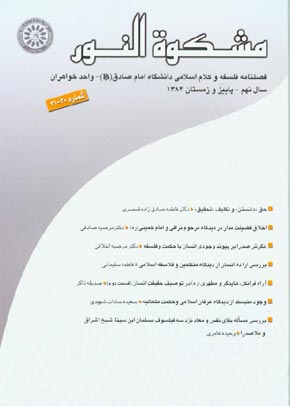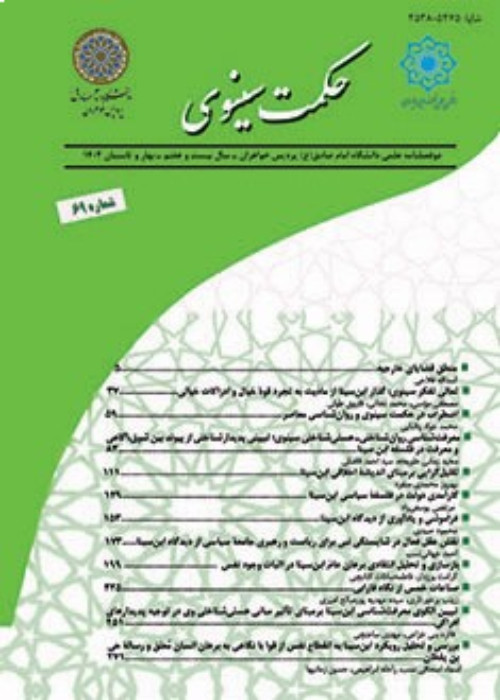فهرست مطالب

نشریه حکمت سینوی
پیاپی 30-31 (پاییز و زمستان 1384)
- 160 صفحه، بهای روی جلد: 5,000ريال
- تاریخ انتشار: 1385/04/15
- تعداد عناوین: 8
-
صفحه 5
-
صفحه 12مقاله حاضر به بیان دیدگاه های اخلاقی مرحوم محقق نراقی و امام خمینی (ره) می پردازد. نتیجه بیان نکات عمده این نظریات این است که دیدگاه های مذکور علی رغم وجود تمایزات، منطبق بر اخلاق فضیلت مدار می باشد. به علاوه با ورود میزان شریعت در باب درستی و نادرستی افعال می توان از آنها به عنوان اخلاق شریعت مدار نیز یاد کرد. همچنین این نظریات به دلیل اشاره به فضایلی چون ایمان و غیره صبغه ای الهی و دینی می یابند.کلیدواژگان: اخلاق فضیلت مدار، فضیلت، رذیلت، عدالت، نفس، اعتدال، عقل نظری و عملی
-
صفحه 33صدرالمتالهین انسان را حقیقت واحد ذو مراتبی می داند که در ذات و گوهر خود دائما در تحول و سیلان است و بواسطه این حرکت می تواند از مرتبه طبیعت به تجرد مثالی یا برزخی و سپس به تجرد عقلی و در نهایت به مقام فوق تجرد یعنی مقام الهی نایل آید. یعنی نفس آدمی از محسوس که همان معقول هیولانی است به تخیل که معقوله بالملکه است و از آن به معقول بالفعل و عقل فعال. و رفتنش از دنیا به آخرت و سپس از آن جا که برتر از آندوست منتقل می شود. زیرا نفس انسانی در دنیا بواسطه ریاضت و تمرین در ادراک علوم به جهان دیگر منتقل می شود و از محسوسات به معقولات مسافرت می کند...
کلیدواژگان: علم، ادراک، حکمت، فلسفه، انسان، مراحل استکمال -
صفحه 54یکی از مهمترین ویژگی های انسان اراده و اختیار اوست. اکثر متفکران نسبت به وجود این ویژگی در انسان تردیدی نداشته و آن را امری بدیهی می دانند ولی در مورد معنا و حقیقت آن اختلاف نظر دارند. با توجه به اهمیت اراده به عنوان مبدا فعل، شناخت معنای آن و علل و عواملی که در شکل گیری آن مؤثر است، ضرورت دارد. در واقع با توجه به اینکه چه معنایی از اراده در نظر گرفته می شود. نگرش انسان در حوزه های مختلف علوم انسانی شکل خاصی می یابد. گروهی اراده را از سنخ ادراک می دانند، برخی آن را از جنس شوق و میل در نظر می گیرند و گروهی نیز آن را امری غیر از علم و میل می دانند و در واقع یک تعریف سلبی ارائه می دهند...
کلیدواژگان: اراده انسان، فعل ارادی، میل، شوق شدید، کیف نفسانی -
صفحه 78شناخت سرشت پیچیده و ذواضلاع انسان به منظور فهم موقعیت وی در جهان هستی و غایتی که از رهگذر حضور در این عالم تعقیب می کند. از منظر اندیشمندان مختلفی از حوزه علوم انسانی مورد توجه و دقت واقع شده است. فرانکل و هایدگر دو متفکر - یکی روانشناس و روانپزشک و دیگری فیلسوف از مشرب اگزیستانسیالیسم و شهید مطهری (ره) فیلسوفی متاله از جهان اسلام سه اندیشمندی هستند که در این مقاله آرایشان پیرامون تحلیل حقیقت وجود انسان مورد بررسی قرار گرفته است...
کلیدواژگان: انسان، فطرت، خداوند، دین، غایت مندی، مرگ، جاودانگی، آخرت -
صفحه 101مبحث وجود منبسط از فروع و لوازم پذیرش دیدگاه وحدت شخصی وجود است. دیدگاهی که از جانب غالب عرای نامدار اتخاذ گشته و مورد سوء فهم های بسیاری در طول تاریخ واقع شده است. مدعای این دیدگاه آن است که وجود حقیقی همان وجود حق تعالی است و ماسوی از هستی برخوردار نیستند. برداشت نادرست از این دیدگاه که منافی با ارسال رسل تلقی شده است، آن است که عرفا هر آنچه را که غیر از وجود خداوند است، نیست و معدوم می دانند. حال آنکه عرفا با تقریر خاصی که از وحدت و یگانگی وجود دارند و با طرح مبحث وجود منبسط زمینه برخورداری ممکنات از تحقق را مطرح می کنند...
کلیدواژگان: وجود منبسط، وحدت وجود، تجلی، تشکیک ظهورات -
صفحه 124آنچه نفس، این موجود بی همتای الهی را از دیگر موجودات متمایز می سازد. صفت بقا و جاودانگی آن است. مقاله حاضر سعی دارد مساله بقای نفس را از دیدگاه فلاسفه بزرگی مانند ابن سینا، شیخ اشراق و ملاصدرا مورد بررسی قرار دهد. همچنین به دلیل رابطه تنگاتنگ، میان بقای نفس و مساله معاد، بحث از معاد نیز به دنبال آن خواهد آمد. در آغاز پس از نگاهی گذرا به معنای بقا و مراد فلاسفه از ان به بیان ادله هر کدام از فلاسفه را در باب آن خواهیم پرداخت که حاصل آن اثبات صفت جاودانگی برای نفس خواهد بود...
کلیدواژگان: نقش ناطقه، بقا، فساد، معاد روحانی، معاد جسمانی، ابن سینا، شیخ اشراق، ملاصدرا -
صفحه 3
-
Page 12This essay studies the late scholar Naraqi and Imam Khumayni's views on the moral. The result is that, despite the differences, their views are in agreement with based-virtu moral. As well they are superposed based-sharia moral, because its scale is involved in determination of being true or wrong of actions. These theories possess religios and Divine colour, because of containing virtues such as faith (iman), trust, submission and etc.
-
Page 33Sadr al-mutaallihin conceives human being as the one graded reality that her/his essence is permanently in change and movement, and hat, in consequence, can move from nature degree to the imaginal abstraction, and then to the intellectual abstraction stage, and finally to the superabstraction, Divine degree.Namely, the human soul moves from the sensible degree, material intelligence, to the imagine stage, intelligence in habitus, and then to the intelligence in act, and active intelligence, and then from the world to the afterlife, and afterwards to a dominant world; because the human soul in the world transfers to the superior world through asceticism, and practice in understanding of sciences. Hence, all the degrees of intellective faculty are based on the abstraction of matter, and immigration of this world. Since the degrees of obstraction and separation of the matter are different, the degrees of understanding the truth, and of Divine closeness (qurb), and of acquisition her/his blessing too are differentThe knowledge ('ilm) is on level with (musaviq) existence, and therefore is graded like existence; hence the human lnowledge can comprehened the whole degrees of existence; that is all degrees of existence can belong to human knowledge. He accounts the human knowledge and the comprehension peregrinating towards perfection degrees, and transferring from one appearance to the other. Therefore, the knowledge is inseparable part of human existence. On the other side, wisdom and philosophy are of kinds of knowledge, then they are inseparable parts of human existence. In sadra's opinion, in order to achieving the truth, ordinary sciences are necessary conditions not the enough ones, and since the more the science relates to high issue, the more valuable it is; therefore the wisdom (hikma) science which is to know exalted truths such as human truth, the world truth and its start point; is possessed of exclusive position and honor. This essay intends to prove the problem in sadra's metaphilosophy (al-hikma al-mutaaliya).
-
Page 54One of the most important characteristics of human is free will. The most of intellectuals have no doubt on existence of this characteristic in human being; and regard it as an evident issue, but they disagree about its definition and the nature. According to the importance of free will as starting point of any action, it is necessary that its definition, causes, and the factors effective in its formation are known.In fact, on the basis of what definition of will is regarded, human view in different spheres of the humanities is molded specifically. Some account free will a kind of comprehension, and the others, of kind of passion and desire, and another group, something except knowledge and desire and define it negatively in fact. These disagreements influence their views about different topics such as moral science, epistemology, social science, political science, and etc.In this essay, I intend to express the various philosophical and theological views on the definition of human will in order to consider the position of will in formation process of will action, and select an appropriate definition among them.
-
Page 78In order to understand the human position in the world of being, and her/his end (ghaya) for the sake of presence in the world, the various humanities intellectuals have taken into consideration the understanding complicated and several aspect-nature of human. Frankel (a psychologist and psychiatrist) and Heidegger (a philosopher), of existentialism, and the martyer Mutahhari, a muslim deified philosopher, are three intellectuals whose views on analyzing the truth of human existence are regarded.In the part one, their views were explained. But in the part two, in addition to studing the start point of faith ('iman), and the position of human in the world of being in their opinion, it is specified properly that if we interpret the human as a worldly single-dimentional being, even in the best possible modes, how this idea covers up understanding of an intellectual on aspects of human existence, and makes her/him disabled on the true analysis and cognition.This disability shows itself especially in analyzing of death, and its impact on being purposeful (limitedness) of human life and her/his direction towards perfection.
-
Page 101The subject of extended existence is one of the branches and necessaries of accepting individual unity of existence view. The most of celebrated of gnostics have chosen the view, but many of thinkers have misunderstood it during the time.Its claim is that the real existence and existence of the God on high are the same, and the beings except for Him are non-existents.Misunderstanding of this idea which denies the sending of the Prophets, means the gnostics account the beings except for the existence of God are non-existents.But, because of the special understanding of unity and oneness by them, and of the discussion of extended existence, the possibilities can be benefit by the existence. In this essay, at first, we discuss about the individual unity of existence in metaphilosophers and gnostics, and then about the extended existence, and about the systematic ambiguity (tashkik) of manifestants (zuhurat), which is one of the branches of extended existence discussion, and which play the important role in understanding the manner of coming into being of possibilities.
-
Page 124What distinguishes the soul, this unique Divine being from the other beings is immortality attribute.This article regards the immortality issue in great philosophers like Ibn Sina, Shaykh Ishraq and Mulla Sadra. And because of close relationship between immortality of soul and resurrection, we study the latter as well. AT first, after glimpse at the definition of immortality and the philosopher's view of it, we express their proofs about this issue. The result is affirmation of immortality attribute of soul.Then we examine the definition of resurrection and its differences with the definition of immortality, and express the views of philosophers mentioned as to its quality. The results is that Ibn Sina proves rationally the spiritual resurrection and refers corporeal resurrection to the Law. Shaykh Ishraq proves corporeal resurrection with emphasis on Illuminationist (Ishraqi) principles, but he cant proves the objectivity of body related to this world and the next. Mulla Sadra explains and proves corporeal resurrection via originating eleven rigid principles.


